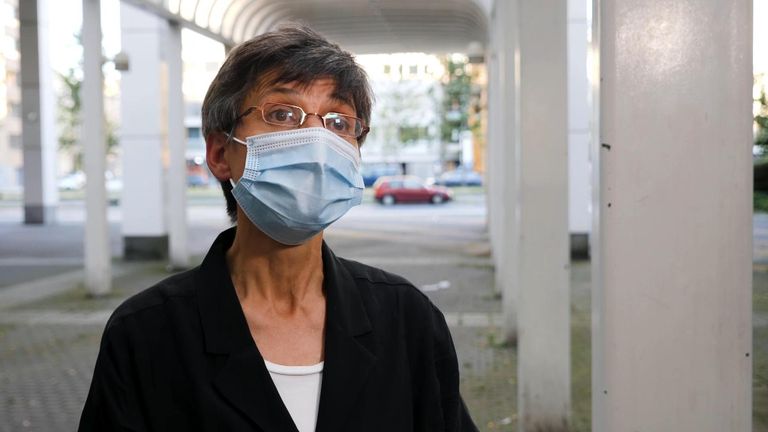Lockdown restrictions were eased too quickly and now “severe measures” may be required to quell a second wave, according to the governor of Belgium’s worst-affected province.
Cathy Berx, who oversees Antwerp province, told Sky News that she could “understand the fear” of a return to a full lockdown, but said that the virus was now spreading so fast that she is asking people to stay away from Antwerp.
The latest figures produced by the Belgian government show the average number of daily infections increasing by 77% compared to the previous week.
Nearly 10,000 people have died of the disease, giving it one of the highest per-capita mortality rates in the world.
Mrs Berx has been the provincial governor since 2008, acting as the representative for the federal government. She told Sky News that she would “at least understand” if the UK decided to introduce quarantine restrictions on visitors from Belgium “even though it would not be nice”.
Antwerp has seen a rapid increase in cases over recent weeks, driving talk of a second wave across Belgium.
Around half of the recent cases of coronavirus recorded across the whole country have stemmed from this single province.
Antwerp has now introduced a night-time curfew as well as tight restrictions on social bubbles. In addition, Mrs Berx has asked residents to stay at home, and also work from home as much as possible,
When I asked whether she agreed that the lockdown had been eased too soon, she replied: “I fully agree – especially in Antwerp. They worked with parameters like the reproduction R rate.
“They made the calculation on that rate for the entire country but they didn’t apply it for every region. If they had applied it to Antwerp as a region they would have seen it was still very high.
“Over 147 days, there was not one single day without new infections in Antwerp. That’s the issue – there was still so much virus around in Antwerp – and when you have a small outbreak, it can spread very, very fast.”
She was also critical of other elements of the province’s response to the “first wave” of the pandemic, saying that “people were uncertain about how to behave” after restrictions were lifted, and that too little effort had been placed into checking that people were observing mandatory self-isolation or quarantine.
“The legislation exists but it was not really carried out,” she said.
:: Listen to The World Tomorrow on Apple podcasts, Spotify, Google podcasts and Spreaker
Across Antwerp, Pierre van Damme is in his laboratory. A professor of virology at Antwerp University, he also chairs the Vaccine & Infectious Disease Institute, which works with the World Health Organisation, among others.
He agrees that lockdown measures were lifted too soon in Antwerp, but points to other reasons for the province’s upsurge in cases.
He said: “Antwerp has a very high population density, which is wonderful for the virus because it can easily go from one person to another.
“It is also a very international city, with many cultures, so communicating about measures can be a problem when people are speaking 20 or 30 languages.
“And there is a lot of international exposure, with the harbour, and traffic and lots of companies.
“This is a second wave starting. People suffered a lot from the real lockdown for eight to ten weeks, and then they thought it was over – that they could have parties and celebrations; hug and kiss. And then, two to three weeks later, the numbers start increasing again.
“It shows that if you don’t respect physical distancing, the infection spreads very easily.”
Professor Van Damme is leading research work on a potential vaccine. Phase one tests have just started and will be followed by further trials later in the year.
He says that, if all goes well, there may be a vaccine available for vulnerable people by the middle of 2021, and for the larger part of the population by the end of 2021, but adds, as a note of caution: “That means we still need to be very careful as we live with this virus for another year and a half.”



